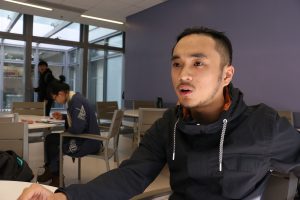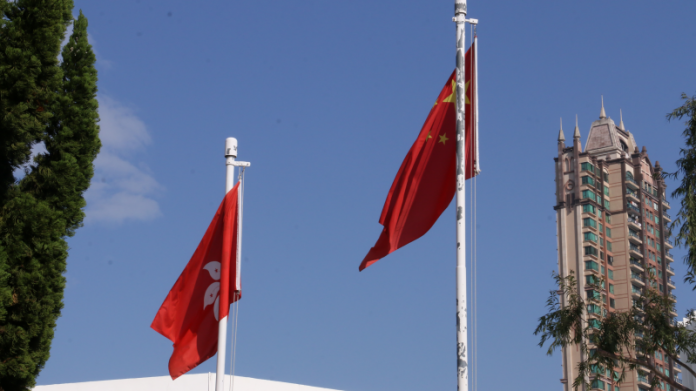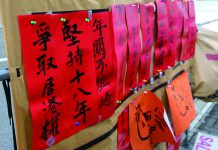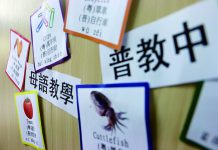Three generations of Hongkongers show how sentiments towards China are changing
By Rivers Zhang & Nannerl Yau
Anyone browsing Hong Kong social media on November 17, 2015 could not have failed to notice the big showdown set for that evening. Hong Kong’s world cup qualifier against China at Mong Kok stadium was much more than a football match. Inside the stadium, Hong Kong fans booed the national anthem and held up signs saying “Hong Kong is not China”. Emotions were just as highly charged outside the stadium – including at the outdoor screenings of the match in various neighbourhoods.
Fung Long-hei, then an 18-year-old student, watched the match with other Hong Kong supporters at one such screening in Sham Shui Po. Fung, born in Hong Kong in 1997, the year the former British colony was transferred to Chinese sovereignty, was clear where his allegiances lay as he cheered on the local team and swore at its opponents.

Fung’s antipathy towards China is not restricted to the football pitch – like many of his generation he defines himself as a Hongkonger rather than a Chinese, unlike the Hong Kong people of his parents’ generation.
In the 20 years since the handover, the degree to which Hong Kong people have identified with some form of Chinese identity has seen ups and downs, but in recent years, the trajectory has been downwards. The University of Hong Kong’s Public Opinion Programme has been tracking Hong Kong people’s identity since 1997. Between 2008 and 2016, those who see themselves as a Hongkonger or a Hongkonger in China rose from 47.4 per cent to 63.7 per cent while those who identified as Chinese or Chinese in Hong Kong fell from 47 per cent to 33.9 per cent. The figures are even starker when they are broken down into age groups. For 18 to 29-year-olds, those who identify as Hongkongers in a broad sense rose from 58.3 per cent to 83.8 per cent, while those who identify as Chinese in a broad sense dropped from 41.2 per cent to 13.3 per cent in the same time period.
The degree to which Hong Kong people identify with being Chinese is inextricably linked to how they perceive China itself and, according to Brian Fong Chi-hang, a professor at the Education University of Hong Kong, is a reflection of “generational politics”.
“Each generation experiences important historical signature event[s]. These shape that generation’s world view,” he says.
Lau Man-yee, a secondary school liberal studies teacher, was born in Hong Kong in 1967, a year in which Hong Kong was rocked by violent riots against colonial rule that were inspired by the Cultural Revolution in the Mainland.
Her memories of China from her childhood are of visiting relatives with her parents – they often had to bring a lot of clothes and food because resources were scarce. “But after I grew up, it was no longer a must to bring stuff when we visited our relatives,” she says.
Despite China’s remarkable economic growth in recent decades, Lau still retains an image of the Mainland as a bland place. “When you entered a department store in mainland China, it was like all the clothes were blue and grey, and you had no alternative colours.”
For a long time, this image stayed with Lau and so she did not harbour high hopes for the country’s economic and democratic development. “When I was young, I wouldn’t demand or expect that the Mainland should develop in a very ideal way, because it really was very backward,” she says.
As for the present political conflicts between Hong Kong and the Mainland, Lau thinks they are an inevitable and necessary consequence of the rapid strengthening of China’s economy in the last decade. “When your economy is surging at such a fast pace, many will demand a similar pace of progress in core values like freedom and democracy,” Lau says.
Like Lau Man-yee, Ng Hing Tak was also born in 1967. The difference is he was born in Guangdong and came to Hong Kong when he was 16. As a young child, Ng experienced the Cultural Revolution in China. And as a young man in Hong Kong, a signature event was the crackdown on the 1989 pro-democracy movement in Beijing. “The feeling was like, your home caught fire,” Ng says. “You wanted to rush back to save your family.” Being the same age as the student protesters in Tiananmen Square, he was moved by their sacrifice for their country’s future. It bolstered his sense of patriotism and made him want to fight for a better China.

However, in the face of today’s tensions and conflicts between Hong Kong and the Mainland, Ng now thinks Hong Kong people should put the economy first instead of focusing too much on political protest and resistance.
“People nowadays don’t understand that respect and status always comes after money,” says Ng.
Growing up in an age of instability and scarcity has instilled in Ng a strong determination to climb up the social ladder. To him, Hong Kong’s return to China represents more opportunities to prosper. “When we were studying at university,” Ng says, “we usually only thought about our aims, like buying a nice flat and car. We would focus a lot on how to improve our quality of life.”
Law Ka-lai, who was born in 1984, the year that Britain and China sealed Hong Kong’s fate by signing the Sino-British Joint Declaration, has a different view of China. She says Hong Kong people do not necessarily have a sense of belonging to China.

“I realised the great cultural difference when I went there. The food was dirty and made me sick … I can’t see a strong connection between us,” says the Chinese language teacher.
She did not always have a negative view of China. In secondary school she joined exchange tours to urban cities and service trips to rural villages and witnessed the great advances in infrastructure and technology in the Mainland. But what she has seen since then is that the economic miracle did not bring greater civil rights and political participation.
Law grew up in the 1980s and 1990s, which were the golden years of rapid economic development for Hong Kong. China’s opening up and reform policy attracted foreign capital to invest in China, and Hong Kong became a super connector. Within a couple of decades, the city had managed to transform from an industrial centre into an international financial centre. Popular culture thrived and the general living standard improved.
Law’s memory of Hong Kong at that time, under British rule, is that it was more peaceful than it is now. She admits to having different expectations for the city back then. “You would demand less at that time, since you knew you are ruled by a colonial government,” she says of the pre-1997 days.
Choy Kai-leung, who was also born in 1984, candidly says that he does not have a close bond with the Chinese people. He says he was more excited when Cheung Chau windsurfer Lee Lai-shan won a gold medal in the 1996 Olympics than by the handover in 1997.
Choy concludes that the June 4 crackdown is the major reason he identifies more as a Hong Kong person rather than a Chinese person. “Under the rule of the People’s Republic of China, the Chinese have lost their original character,” Choy says.
Every five years, Choy joins the June 4 candlelight vigil in Victoria Park, although he sees little hope of helping to build a democratic China though shouting political slogans every year. This sense of futility has contributed to the falling number of participants at the vigil recently. Last year’s turnout of 125,000, as reported by the organisers, was an eight-year low.
Fung Long-hei, the 1997-born Hong Kong football team supporter, is one those who refuses to join the vigil, because he thinks it is useless to demonstrate every year as nothing can be achieved. Fung, who is a social work student, is a former member of Scholarism, the student organisation that led the protest against government plans to introduce compulsory national education in schools in 2012. Like many of his peers, Fung has embraced a local Hong Kong identity and is firmly against any further integration with the Mainland.
Fung is dissatisfied with what he sees as increasing interference from Beijing and its tightening control over Hong Kong’s politics and economy. He sees separation rather than negotiation as the solution to gaining greater freedom. “The situation is like, I have no relationship with this person, but I have to listen to him and be his son. Honestly, it makes me somewhat resentful,” Fung says.
Brian Fong, the Education University professor, is unsurprised that young people have a negative view of China.
“The things you experience when you’re growing up in your teens and into your twenties influence you the most,” he says. “For this generation, it might be the anti-express rail movement, anti-national education, the Umbrella Movement and the National People’s Congress 831 framework, the [Legislative Council] oath-taking controversy. All these interfere with our autonomy and undermine one country two systems,” he says.
Ma Ngok, an associate professor from the Department of Government and Public Administration at the Chinese University of Hong Kong (CUHK), agrees with Fong that there are generational factors behind the changing sentiments towards mainland China among people of different ages. He says people born in the 1960s still lean towards nationalism, and that influence passes onto their children. “The older generation are more aware that they are Chinese, so they tend to think the happenings in China are somehow related to them.” Ma says.
The influence of national identity fades with the younger generation born after 1997. “Hongkonger” has become a separate identity. Since more people are preferring to assert their Hong Kong identity over a Chinese identity in recent years, Ma concludes that China’s efforts to win Hong Kong people’s hearts has been a failure.
“Before 2008, I guess many people would still talk about the huge economic benefits Hong Kong would receive after integration,” Ma says. “But after the financial crisis in 2008, many found out the benefits for the city were not as huge as predicted.”
Taking into consideration the increasing political control, the more negative side of greater economic integration and competition over baby formula, hospital beds and school places, more Hong Kong people are finding it difficult to accept further integration.
Looking to the future, Ma predicts greater deterioration of relations that will continue to tear Hong Kong and mainland China apart. “All these [tensions] build up and Hong Kong people will find themselves walking further away from mainland China.”
Edited by Avery Tsui














































